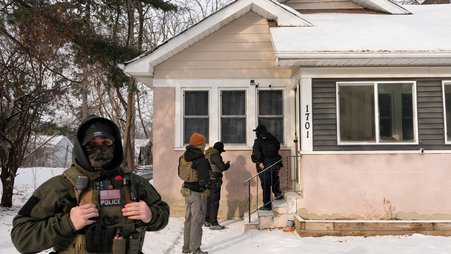When the Trump administration quickly fulfilled our Freedom of Information Act request for a memo belying its own rationales both for mass deporting Venezuelans and for cracking down on leaks to the press, we had plenty of theories about why.
Maybe someone in the FOIA office used our request as an opportunity to blow the whistle. Maybe it was some kind of mistake. But one possibility that never occurred to us was that administration higher-ups thought that the memo made them look good. After all, everyone knows President Donald Trump hires only the “best and most serious people.”
But according to a report in The New York Times, that’s exactly what happened. So who was the poor junior staffer who somehow read a short, straightforward memo wherein intelligence agencies said Venezuela’s government does not control the Tren de Aragua gang, as Trump claims, and took it to mean, well, the complete opposite? The intelligence community had better stop hiring from whatever school gave that kid a degree!
Turns out it wasn’t some kid, though. It was Joe Kent, chief of staff to Director of National Intelligence Tulsi Gabbard. And get this: He’s Trump’s nominee to lead the National Counterterrorism Center. Apparently, after a first memo undermined Trump’s narrative that Venezuelan migrants are actually President Nicolás Maduro’s secret foot soldiers, Kent requested some “rewriting … so this document is not used against the DNI or POTUS.”
The memo released to us was apparently the rewrite — which confirmed the conclusions of the initial memo. It did mention that the FBI believed some Venezuelan government officials might communicate with some members of Tren de Aragua, but no serious legal minds believe that constitutes an invasion that justifies Trump’s invoking of the Alien Enemies Act.
Kent, however, somehow read it (or maybe that’s giving him too much credit) and thought it vindicated the administration. No one else read it that way, including Secretary of State (among other jobs) Marco Rubio. Rubio didn’t even attempt to twist the memo into somehow supporting the administration’s policies — he just said the intelligence community got it wrong.
But the reason Freedom of the Press Foundation (FPF) filed the FOIA in the first place was not to prove whether Maduro has gangbangers on speed dial or whether high-ranking intelligence officials lack intelligence. It was to check whether Attorney General Pam Bondi’s basis for repealing her predecessor’s safeguards against subpoenaing journalists held water.
Bondi, as well as Gabbard, claimed reports from The New York Times and The Washington Post were false when stating that intelligence agencies disbelieved Trump’s claims about Tren de Aragua. The administration, these officials said, needed the ability to investigate the source of the leak, including by subpoenaing journalists, to protect the nation from so-called fake news from the so-called deep state.
The memo, as we’ve written before, confirmed that the Times and Post got it right and the only thing a crackdown on leaks was meant to protect was Trump and his cronies from embarrassment. But the memo has turned into more than that — it’s become Exhibit A on why leaks to the press serve the public interest.
Here’s a non-exhaustive list of news we now know about because of the leaks to the Times and Post, the memo we were able to request as a result of those leaks, and the reporting that followed.
- Kent, the nominee to lead the National Counterterrorism Center, can’t comprehend basic intelligence reports.
- Kent demanded intelligence agencies rewrite their findings to save his bosses from embarrassment and, according to the Times, there are emails to prove it (we have filed requests for those, too).
- There is a major rift between the State Department and the intelligence community about one of the Trump administration’s most significant policies.
- Gabbard requested Bondi initiate a leak investigation based on lies.
- Bondi repealed protections for reporters and their sources based on the same lies.
- The United States mass deported people to a dangerous prison in El Salvador to perform slave labor for a Trump-friendly authoritarian — all based on the same lies.
Virtually every time the government has cracked down on leaks claiming some kind of threat to the homeland, the real threat has been to its own reputation. Usually it takes years to confirm the obvious. It took decades for Nixon officials who once argued that releasing the Pentagon Papers would gravely endanger national security to admit that was nonsense all along. But this time we know the truth almost immediately, thanks to leaks.
Bondi was right about one thing — the leaks undermined the administration’s policies. But she left out that they were policies that needed undermining because they were built on lies — the kinds of lies that the drafters of the Constitution intended journalists to expose when they wrote the First Amendment’s press clause. That’s what the Times, Post, and their sources did, and it’s exactly why journalist-source confidentiality needs protecting.





